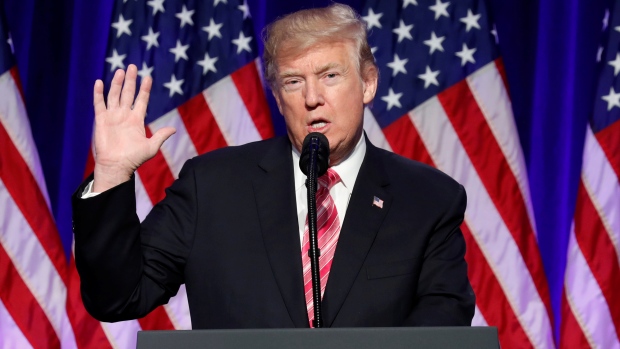GOP Frustration Rises With Trump on Trade Agenda

Senate Republicans are growing frustrated with what they see as a lack of clear direction in President Trump’s trade agenda, which they warn is hurting U.S. exporters
BY ALEXANDER BOLTON for THE HILL
Republican members of the Senate Finance Committee vented their concerns in a recent meeting with U.S. Trade Representative Robert Lighthizer.
GOP lawmakers, especially those from agriculture-heavy states, have two major complaints with the administration.
“We have to negotiate the trade deals and we’ve got to get moving on it or we’re going to be left behind”
They feel it is not listening to Congress’s feedback on negotiations with Mexico and Canada over the future of the North American Free Trade Agreement (NAFTA). Trump has threatened to withdraw the U.S. from NAFTA.
They’re also frustrated by what they see as a total lack of progress in negotiating the bilateral trade agreements with Pacific Rim countries that Trump promised after pulling out of the Trans-Pacific Partnership (TPP) in January.
They made their displeasure known during the meeting with Lighthizer, said Sen. John Cornyn (Texas), a member of the Finance Committee and the No. 2 Republican in the Senate.
“There’s a number of frustrations with their approach including — as I’ve told the ambassador before — they need Congress to ratify it under [Trade Promotion Authority (TPA)] and so they don’t seem to be paying that much attention to what members of the Senate think,” Cornyn said.
TPA gives the administration authority to negotiate on trade deals. Congress, under the TPA law, has the authority to review any proposed U.S. trade agreement and decide whether it will be implemented.
“Members are frustrated the administration isn’t regularly consulting with them during NAFTA negotiations as they’re obligated to under TPA,” said a Senate Republican aide.
GOP lawmakers are worried that altering trade relations with Canada and Mexico too drastically could rattle the economy and wipe out the stimulative punch of the tax-cut package Trump just signed into law.
Texas, for example, relies heavily on trade with Mexico. It exported $92 billion in goods to Mexico in 2016, according to the International Trade Administration.
Senate Agriculture Committee Chairman Pat Roberts (R-Kan.), who also attended the meeting, said he’s worried that the U.S. is losing market share to Argentina in Mexico’s wheat market.
“It would be a paradox of enormous irony if here we’re passing a tax bill to achieve economic growth and on the other side of it pulling the trigger on NAFTA — if the president would do that — could very well cause a farm recession and a stock market reaction that would be very counterproductive,” Roberts said.
Talks with Mexico and Canada grew tense over the fall when the Trump administration suggested replacing NAFTA with a new agreement that would sunset after five years.
Roberts expressed strong opposition to such a proposal.
“If you do that, I don’t know that anyone would sign up,” he said.
A spokesperson for the Senate Finance Committee said Chairman Orrin Hatch (R-Utah) and other members of the panel met with Lighthizer for about an hour to discuss “a variety of trade issues, including ongoing NAFTA negotiations.”
Hatch said “weakening NAFTA would be detrimental to the U.S. and Utah’s economy.”
The U.S. Trade Representative press office did not respond to a request for comment Friday.
GOP lawmakers are also growing exasperated over the lack of progress in replacing the Trans-Pacific Partnership.
Trump transition officials signaled to lawmakers and the media a year ago that the administration would have new deals in place very quickly to replace the TPP, which went forward without the United States.
“You will be shocked by the speed at which bilateral agreements begin to materialize,” a Trump transition adviser told Reuters in January.
But Roberts said “I don’t think there’s been much planning on it.”
Lighthizer has tried to reassure the Kansas Republican by telling him that “there are some possibilities with Vietnam” that the administration is exploring.
“If you do one by one, that takes a lot of time and a lot of effort and we could have had a joint TPP, where you have trade with a country, you plant the American flag and they know you have their back. They don’t want to do any business with China,” Roberts added.
He said Australia and Japan are now taking U.S. business opportunities with other Pacific countries.
Roberts said the lack of work on bilateral trade deals can be explained by the administration’s focus on renegotiating NAFTA and the slow pace of confirming key officials to the trade representative’s office.
Other Republicans who played key roles in the tax-reform debate say they’re also worried about the cloud that Trump’s trade policy is casting over the economy.
“I’ve always said I’m happy to have another administration negotiate better trade deals but we have to negotiate the trade deals and we’ve got to get moving on it or we’re going to be left behind,” said Sen. Ron Johnson (R-Wis.), a member of the Commerce Committee.
Sen. Mike Rounds (R-S.D.), whose home state relies on agricultural trade, said it would have been easier to stick with the Trans-Pacific Partnership instead of pursuing multiple bilateral trade deals.
He said multiple trade talks create difficulty because every country the United States negotiates with will be concerned about not getting as good a deal as a foreign competitor.
“My producers in South Dakota could really use some additional international markets,” Rounds said.
But he also gave Trump credit for re-opening up China to U.S. beef exports after a 14-year hiatus.
“I think they’re just finding it more difficult to get a lot of little agreements done,” Rounds said.
“Am I opposed to individual treaties with individual countries? No. But I just think it’s much more difficult than doing a single deal,” he added.












